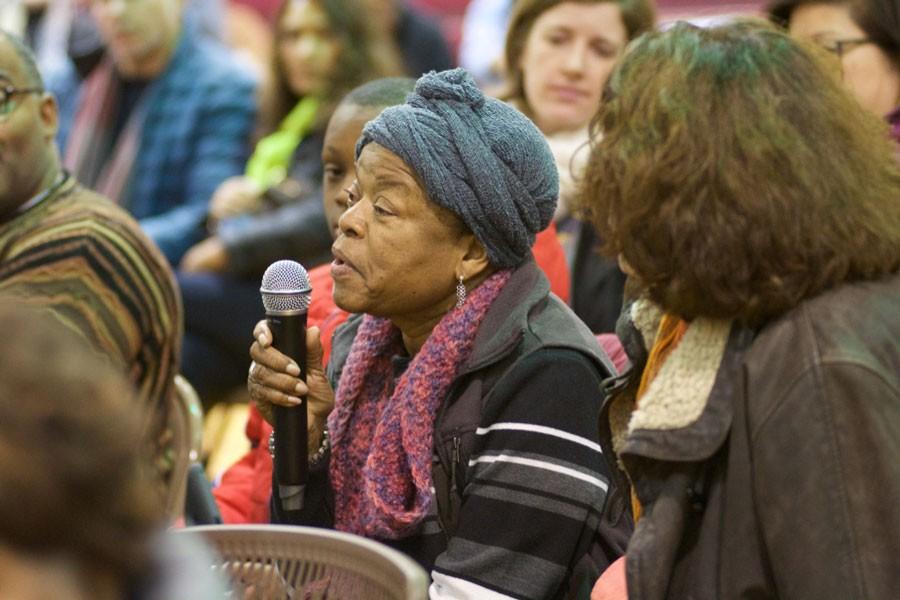Evanston residents discuss alleviating gun violence after ‘Chi-Raq’ screening
Sophie Mann/Daily Senior Staffer
Around 50 Evanston residents gathered at the Fleetwood-Jourdain Community Center Saturday for a free screening and subsequent discussion of Spike Lee’s movie “Chi-Raq.” The film, which was released in 2015, explores the issue of gun violence in Chicago.
January 18, 2016
Around 50 Evanston residents discussed possible solutions to Chicago-area gun violence after city officials hosted a free screening of Spike Lee’s “Chi-Raq” at the Fleetwood-Jourdain Community Center Saturday afternoon.
“Chi-Raq,” based on the Greek play “Lysistrata,” centers around a woman on the South Side of Chicago who convinces the other women in her community to abstain from having sex with men in two rival gangs until they agree to end the violence. Although a comedy, the movie explores the reality of gang and gun violence on the South Side.
Lesley Williams, head of adult services at Evanston Public Library and the discussion’s facilitator, used the movie as a framework to explore the issue of gun violence in Chicago and surrounding neighborhoods. Williams probed the audience as to who was responsible for the deaths of certain characters in the film.
“The system!” an audience member shouted out.
“What makes up the system?” Williams asked.
“All of us,” the audience member replied.
Viewers shared their opinions on whether or not religion helps people cope with tragedy, how to create new jobs to counteract crime and poverty and how to strengthen the bonds of community — bonds that many elderly residents insisted were broken when guns and drugs first entered Evanston.
One of the attendees who spoke up was Carolyn Murray, an Evanston gun control activist who lost her son, Justin, to gun violence in 2012. Murray talked about her loss and her role in organizing gun buyback programs as a way to reduce crime in Evanston.
“It was cheaper and easier for an Evanston youth to get a gun than it was for him to have an amount of money to go to a movie theater,” Murray said. “I had this idea (of a gun buyback program) because I was sick of gunshots outside of my house. It took murder, and I don’t call them deaths, I call them murders, because my son was murdered.”
“Chi-Raq” garnered a lot of criticism from local officials such as Chicago Mayor Rahm Emanuel and activists who considered Lee’s approach to depicting the city’s gun violence problem to be inappropriate. They said the flashy, comedic nature of the film detracted from the severity of the situation.
This is the first time Evanston has screened a movie this controversial, said Porschia Davis, the city’s assistant youth and young adult program manager. Davis, who co-hosted the event, told The Daily “Chi-Raq” was chosen to allow people within the community the access to see the film because the local theater did not show the movie.
Linda Gates, head of voice in the Department of Theatre at Northwestern, provided some background and brief explanation of “Lysistrata” before the screening. Gates told The Daily it was important that audience members had at least a basic understanding of the play before watching and analyzing the film so they were able to draw parallels between the two and better grasp the important message of the movie.
“You can live your life and sort of not know or not be affected by (Chicago’s violence), and that’s why I think it is important that the whole Chicago community focuses on this,” Gates said. “The film is Spike Lee trying to deal with it. … At least somebody’s trying to do something, which is more than we can say for a lot of our politicians.”
The goal of the discussion was to bridge gaps in perception among Evanston residents and push them to dig deeper into the issues of violence seen in “Chi-Raq,” Davis said. Participants were urged to reflect on how they could change their own actions and, as individuals, create a safer and stronger environment.
“Think about the issue of blame,” Williams said at the end of the discussion. “Think about the difference between taking the blame and taking responsibility. How do we as a community take responsibility?”
Email: [email protected]
Twitter: @rdugyala822


